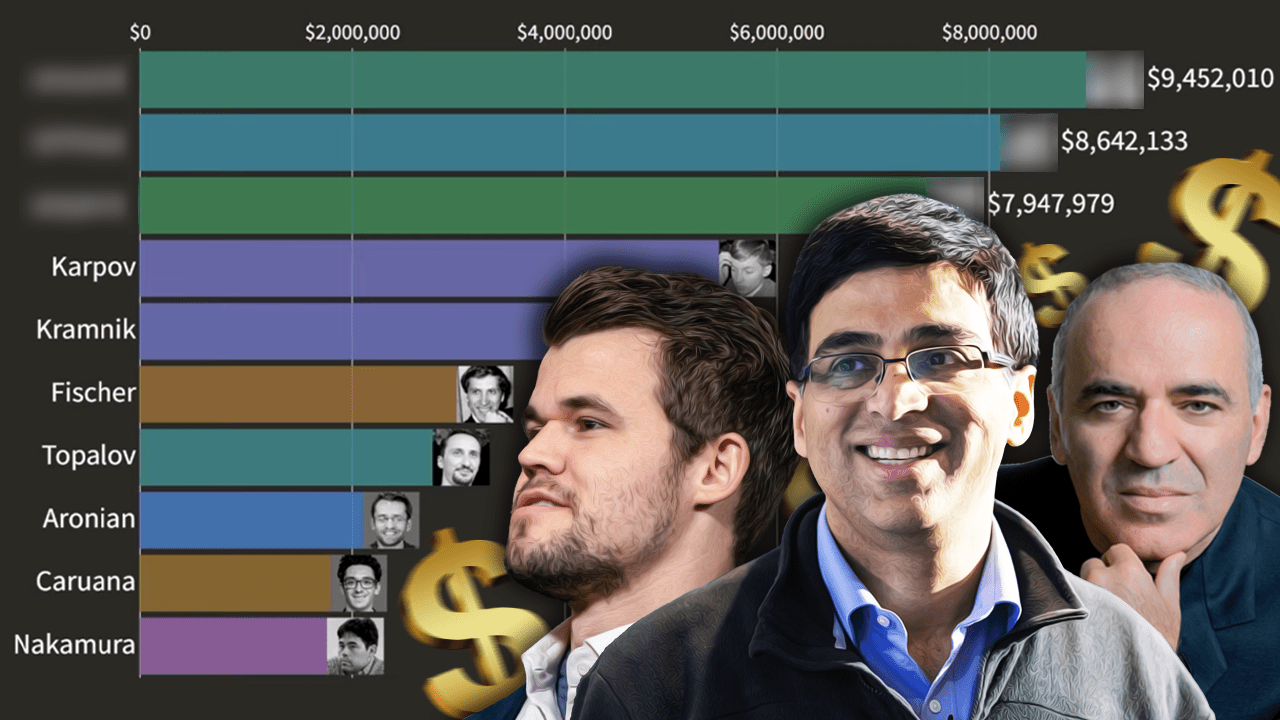
Who Is The Biggest Prizewinner In Chess History?
Have you ever wondered how much money the top chess players can make by winning games? There are so many tournaments and matches run by various organizers that it's extremely hard to track how much prize money the best chess players have won in the course of their careers. No one has ever put together a comprehensive, historical account of exactly how much prize money the best chess players have won at the board—until now.
Included in our analysis are all of the world chess championships, elite super-tournaments, matches, and knockouts for which we could locate prize information dating back to the first international chess tournament held in London in 1851. There are also countless open chess tournaments with moderate prizes that are not considered in this analysis. Usually, such tournaments are not won by the world's biggest prizewinners, but they do represent an important part of the chess prize economy that is not reflected in this analysis.
Also excluded in this analysis are appearance fees, sponsorships, government stipends, and all other substantial sources of income that an elite chess player may have. This list is all about prize winnings.
Note that nominal prizes have been used. Even when, as in the $8,000 Botvinnik-Bronstein match in 1951, the money may not have made it to the players, the stated prizes have been used. In cases where some money definitely didn't make it to the players—namely, the 20 percent cut FIDE often takes in their tournaments—the amount a player officially earned under tournament regulations has still been used.
Let the analysis begin!
- The Evolution Of Prize Money
- Biggest Total Winners
- Biggest Matches
- Biggest Tournaments
- Biggest Annual Winners
- How Good Is The Money, Really?
- Records For Cheapness
- Conclusion
The Evolution Of Prize Money
The first major international tournament was held in London in 1851 and featured a prize fund of 500 British pounds, approximately $2,500 at the time and $95,000 now. These days that would make for a nice but modest prize fund. At the time, however, it was a huge deal.

For more than a century, tournaments like this were exceptional. It was not until 1979 that a tournament would be held for more than $200,000 after inflation.
World championship matches were somewhat more profitable, with 1921 being worth over $400,000 in today's money. After the Great Depression, however, even title bouts suffered in regards to prize money. In the end, in 2022 dollars, the world champions from Wilhelm Steinitz to Alexander Alekhine made about half a million dollars in prize winnings during their careers. The champions from GM Mikhail Botvinnik to GM Tigran Petrosian, however, could not crack $200,000, with Tal not even hitting six figures.
But when GM Bobby Fischer finally made it through an entire championship cycle, that changed. Fischer had always pushed for more prize money, and after billionaire Jim Slater doubled the prize fund for the 1972 World Championship, it was worth a quarter million—about $1.8 million in today's money. Thus, even before the doubling, it was already going to be worth more than twice as much as the previous record holder (the 1921 Championship).

After Fischer-Spassky (don't forget GM Boris Spassky!), the World Championship became a big money affair and has never fallen below half a million in raw unadjusted dollars since. Super tournaments, with some exceptions in the late 1980s and early '90s, took a bit longer to take off. However, there is plenty of money in chess now compared to the old days, and Bobby Fischer is to thank for that.
Biggest Total Winners
The last two world champions as of 2022, GMs Viswanathan Anand and Magnus Carlsen, are the top two prize winners of all time. Anand has had the longer career and played for bigger world champion prize funds, and so he is currently the largest earner. Carlsen will very likely overtake him, although it may take a bit longer now that he is done playing world championship matches. But after $9 million, what's another $500,000?
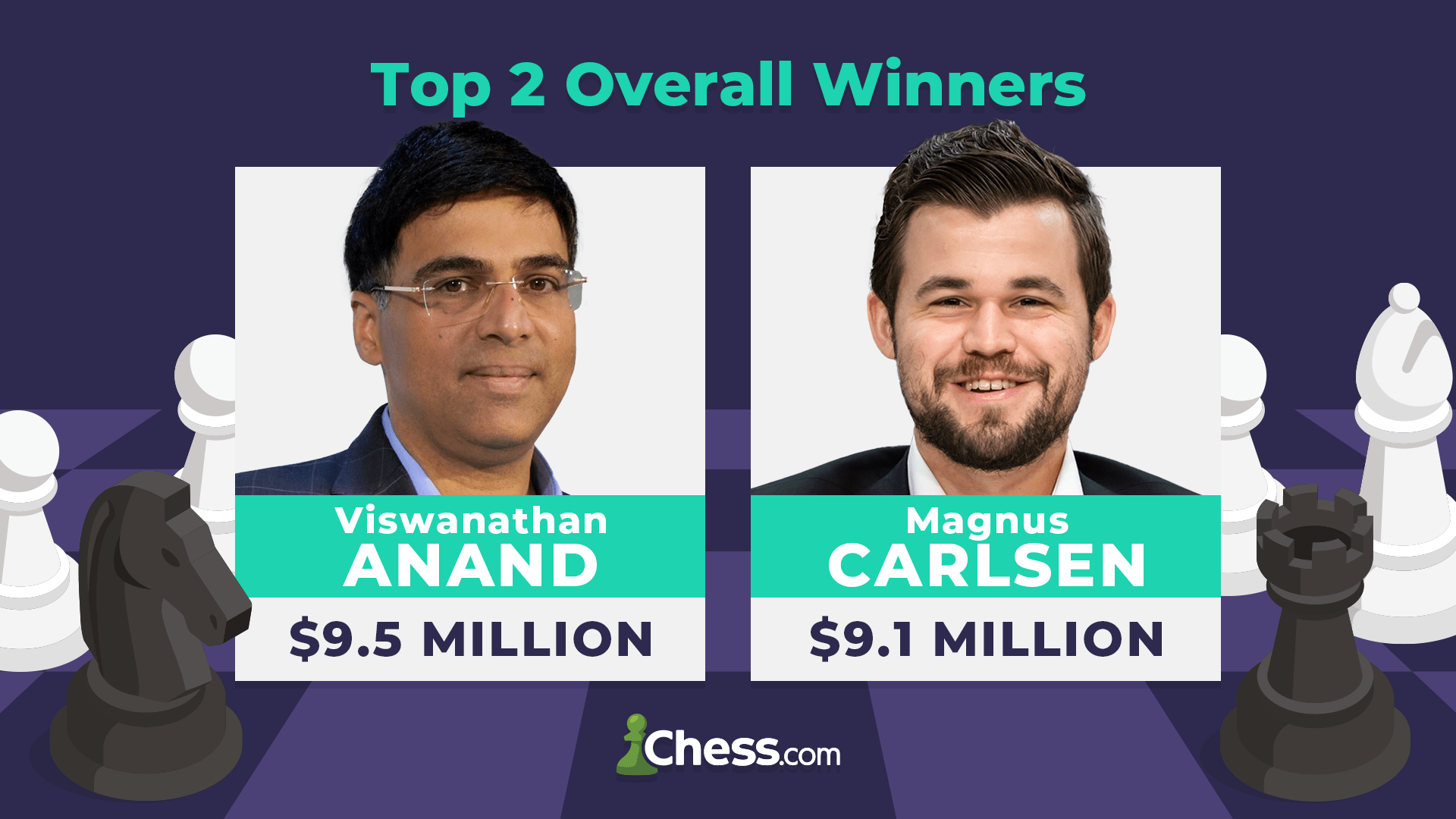
Interest was even higher in the matches between GMs Garry Kasparov and Anatoly Karpov, and the 1993 split in the world championship allowed both to claim a title and thus benefit financially. Adjusting for inflation they remain the two biggest prize money earners in chess; Anand and Carlsen are in third and fourth places respectively.
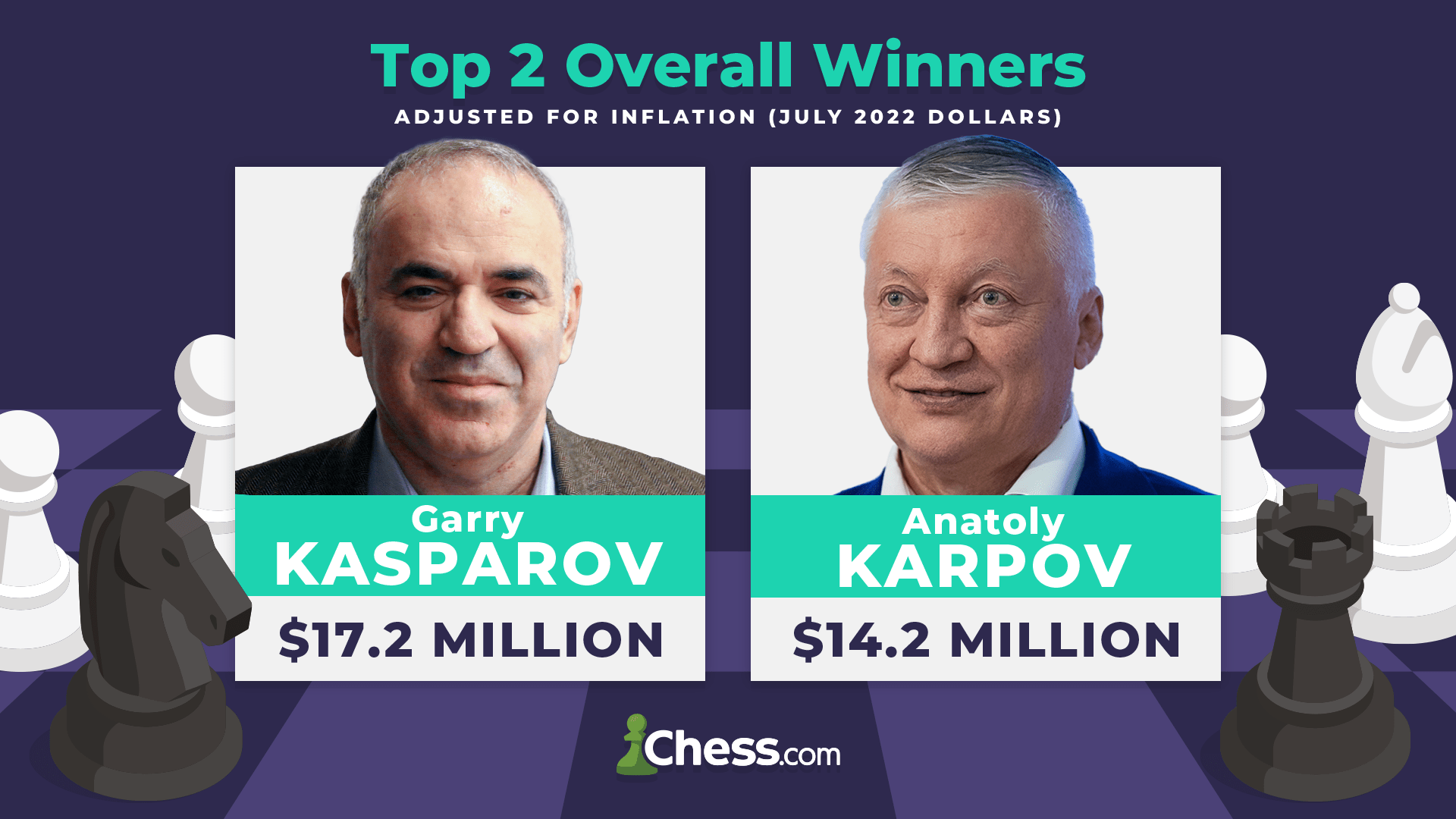
Inflation doesn't help the pre-war champions as much as you might think. Lasker maxes out at about $655,000. The others are all under half a million: Steinitz won about $490,000 in current dollars; Jose Raul Capablanca, $467,000; and Alekhine, $453,000. GM Max Euwe's brief reign and overall timing limit him to just $147,000—about as much as Harry Pillsbury.
The Biggest Winners
Getting straight to the point, here are the top 10 ever in raw dollars.
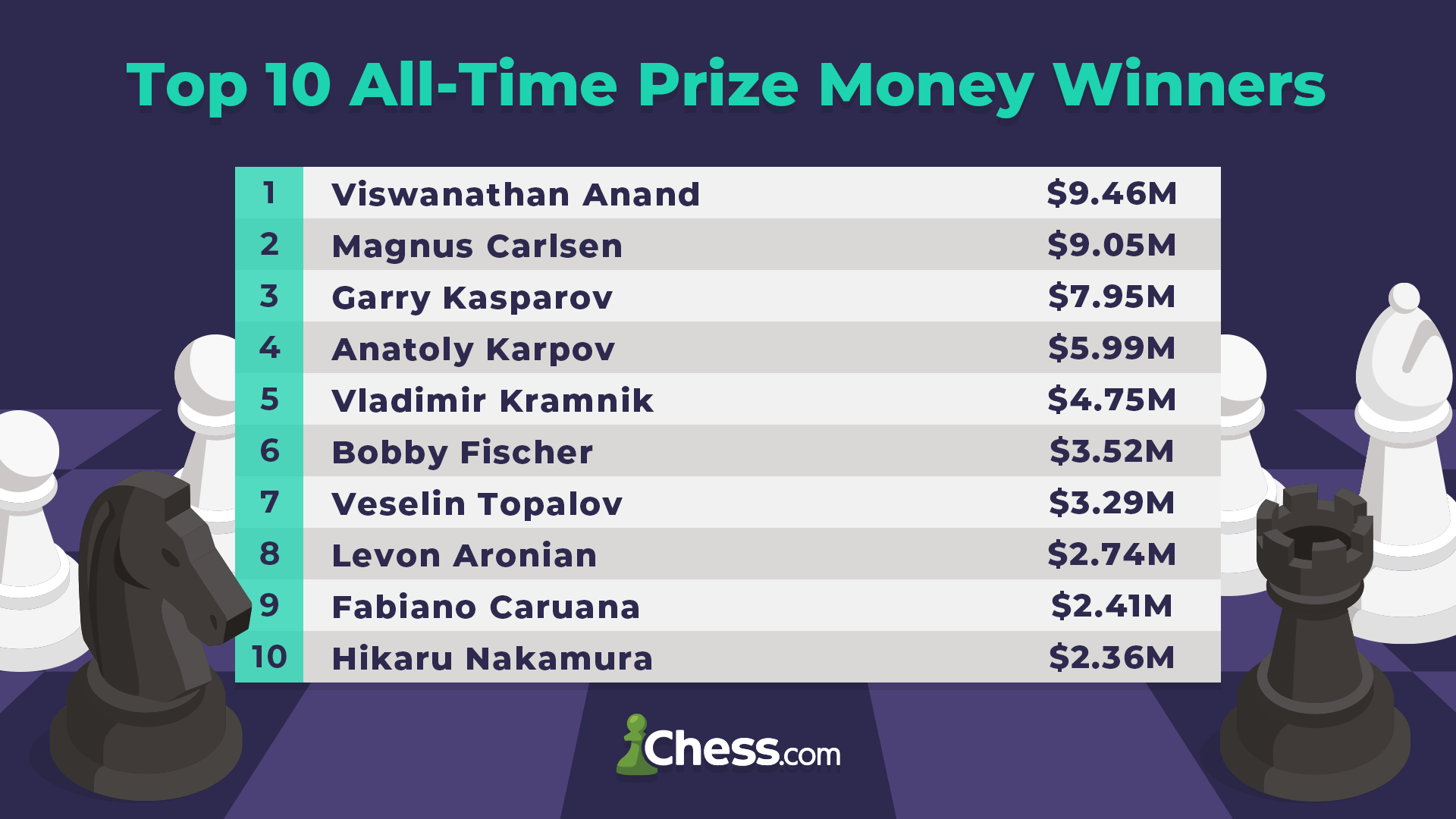
In all, 27 players have earned at least a million dollars playing chess. Here they are including the biggest prize they ever won.
| Rk | Player | Total Prizes | Best Prize | Event |
| 1 | Viswanathan Anand | $9.46M | $1.48M | Match vs. Topalov, 2010 |
| 2 | Magnus Carlsen | $9.05M | $1.53M | Match vs. Anand, 2013 |
| 3 | Garry Kasparov | $7.95M | $1.87M | Match vs. Karpov, 1990 |
| 4 | Anatoly Karpov | $5.99M | $1.30M | Match vs. Anand, 1998 |
| 5 | Vladimir Kramnik | $4.75M | $1.33M | Match vs. Kasparov, 2000 |
| 6 | Bobby Fischer | $3.52M | $3.35M | Match vs. Spassky, 1992 |
| 7 | Veselin Topalov | $3.29M | $988K | Match vs. Anand, 2010 |
| 8 | Levon Aronian | $2.67M | $126K | Morelia-Linares, 2006 |
| 9 | Fabiano Caruana | $2.40M | $509K | Match vs. Carlsen, 2018 |
| 10 | Hikaru Nakamura | $2.36M | $120K | London, 2018 |
| 11 | Sergey Karjakin | $2.23M | $480K | Match vs. Carlsen, 2016 |
| 12 | Boris Gelfand | $2.19M | $1.15M | Match vs. Anand, 2012 |
| 13 | Ian Nepomniachtchi | $2.25M | $905K | Match vs. Carlsen, 2021 |
| 14 | Alexander Grischuk | $1.90M | $128K | Kazan Candidates, 2011 |
| 15 | Maxime Vachier-Lagrave | $1.89M | $110K | Yektarinburg Candidates, 2021 |
| 16 | Boris Spassky | $1.79M | $1.65M | Match vs. Fischer, 1992 |
| 17 | Wesley So | $1.56M | $100K | Las Vegas, 2014 |
| 18 | Shakhriyar Mamedyarov | $1.55M | $100K | Berlin Candidates, 2018 |
| 19 | Nigel Short | $1.41M | $958K | Match vs. Kasparov, 1993 |
| 20 | Peter Svidler | $1.25M | $170K | FIDE World Championship, 2005 |
| 21 | Peter Leko | $1.18M | $600K | Match vs. Kramnik, 2004 |
| 22 | Vasyl Ivanchuk | $1.11M | $250K | FIDE World Championship, 2002 |
| 23 | Gata Kamsky | $1.09M | $562K | Match vs. Karpov, 1996 |
| 24 | Teimour Radjabov | $1.08M | $110K | Khanty-Mansiysk World Cup, 2019 |
| 25 | Michael Adams | $1.04M | $375K | Groningen Candidates, 1997 |
| 26 | Ding Liren | $1.04M | $150K | Grand Chess Tour Final, 2019 |
| 27 | Anish Giri | $1.09M | $50K | London, 2019 and Baku, 2019 |
And how did all of the world champions do? Here they are, adjusted for inflation. You can see that the early champions did okay, the middle champions less so, and the late champions (since Fischer) are all in the million-dollar club.
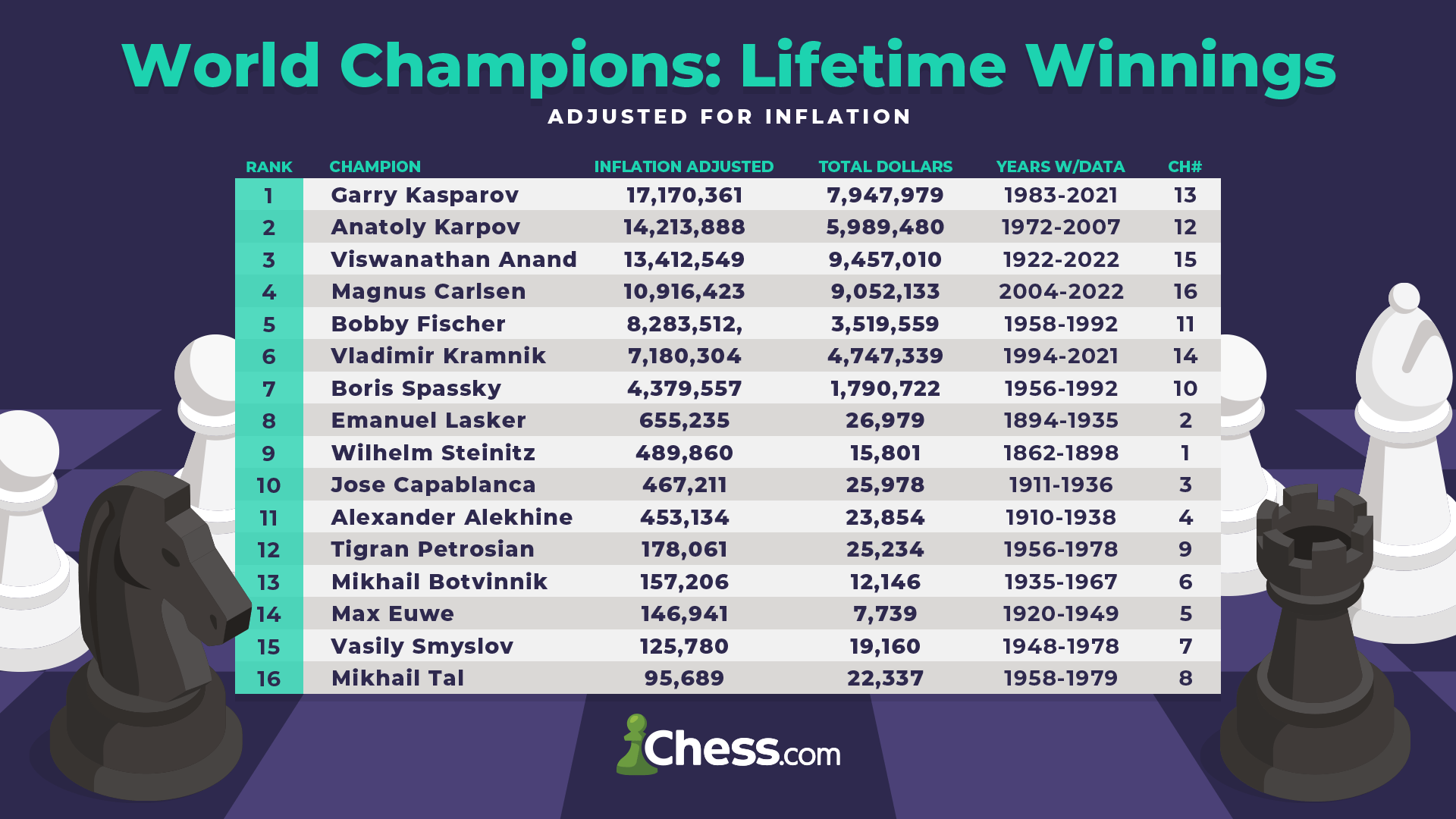
The Biggest Matches
Five million dollars: That's how much it cost to bring Bobby Fischer out of retirement. In fact, the $5 million rematch between Fischer and Spassky in 1992 remains the biggest prize fund ever, for a match or for a tournament. Fischer won $3.35 million, or 67 percent of the prize fund, while Spassky got a $1.65 million payday for his loss. This match was so well-funded that just Fischer's prize is higher than the total fund of any other match or tournament ever held. He's the only player to win two million in a single match, let alone three.
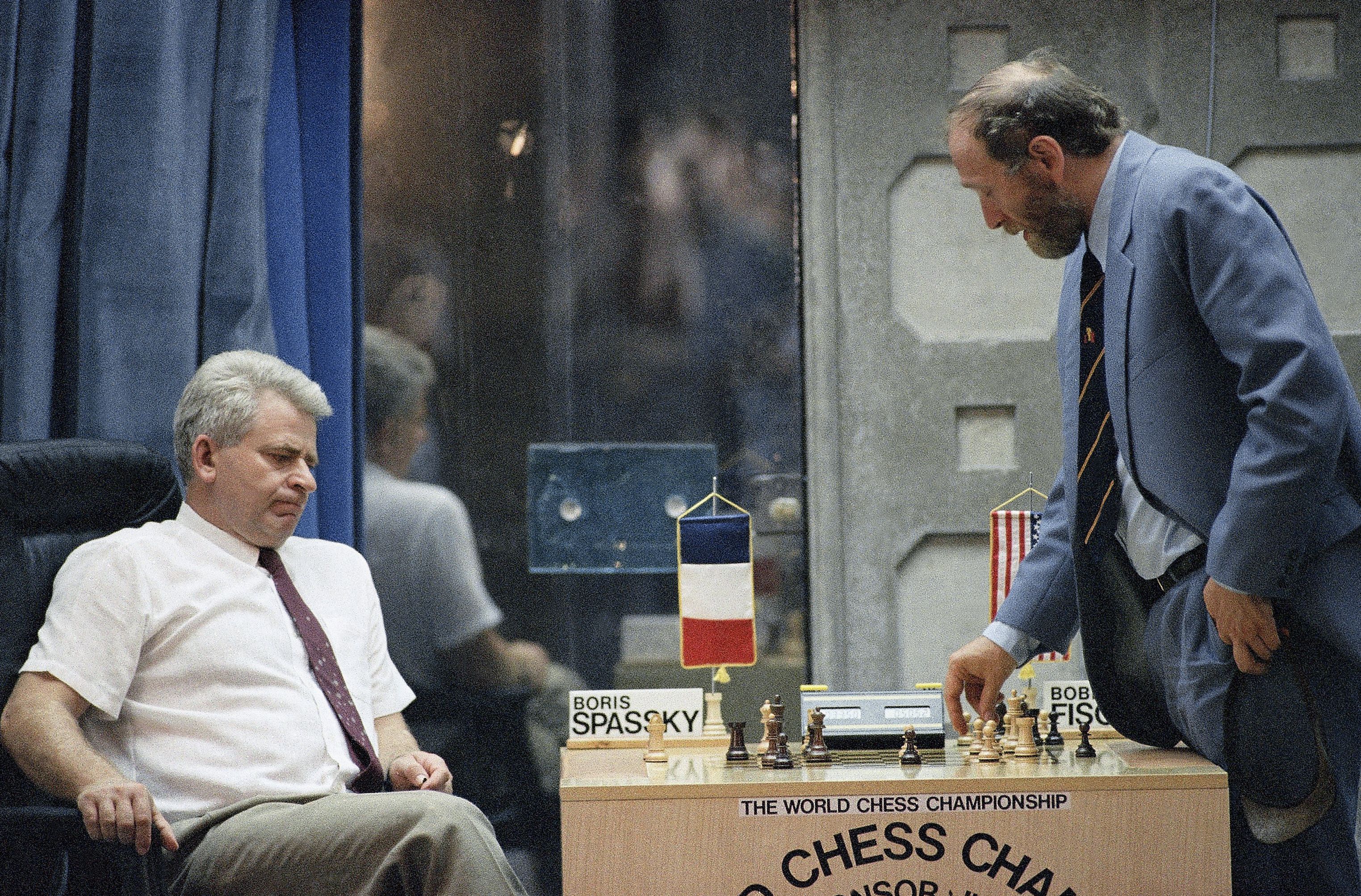
It's not clear how much of that money Fischer ever actually saw, as he was sanctioned by the United States for playing the match in war-torn Yugoslavia at the time. According to Wikipedia, however, his estate when he died in 2008 was valued around $2 million, which seems unlikely if he wasn't able to receive his money.
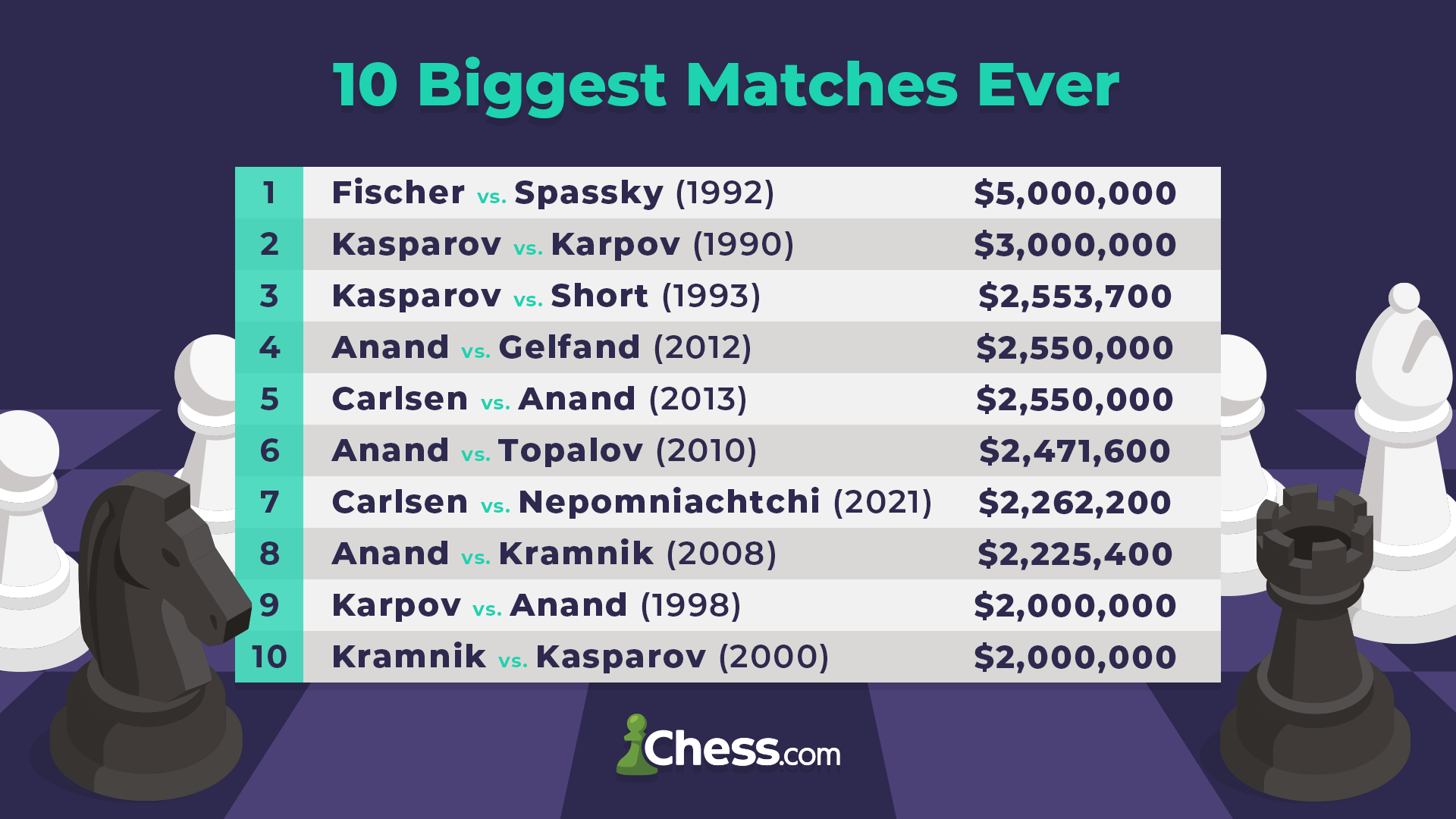
The biggest official world championship match ever was the last Kasparov-Karpov match in 1990, played for $3 million. After they had played a match every year during 1984-87, the three-year wait seems to have produced a rush from sponsors. The 2012 and 2013 World Championships are next at $2.55 million each, and the £1.7 million 1993 match between Kasparov and Short is also in that range after currency conversion.

One more match is worth mentioning: Kasparov's infamous 1997 contest he lost against IBM's Deep Blue computer. The winner was to receive $700,000 of the $1.1 million prize fund, and it went to the corporation, who donated the proceeds to charity. After having earned $100,000 of the $500,000 available for losing the less famous match a year before, Deep Blue became one of the 10 winningest players in chess history at the time. Who knows how big the money would have been for a rubber match, but we'll never know because IBM retired and dismantled the machine soon after getting their win.
The Biggest Tournaments
FIDE's 1999 World Championship in Las Vegas is still the biggest tournament ever, with a $3 million prize fund (although the players received just $2.4 million) split among 100 players. GM Alexander Khalifman officially won $660,000. (According to ChessGames.com, the 1997 Groningen Candidates was also worth $3 million, after removing from their count the $2 million awarded in the Karpov-Anand World Championship that was played right after.)

The 20th-century record for tournaments outside the world championship cycles comes from three tournaments in the PCA Super Classic in 1995 (Riga, Horgen, and Novgorod); each featured a $122,000 prize fund, or about $235,000 after inflation. It was basically the Grand Chess Tour but 20 years ahead of its time—not coincidentally, Kasparov spearheaded both. Unfortunately for the PCA, it could not retain sponsors.
Montreal 1979 held it before that: It was played for $110,000, the first six-figure prize fund in chess history. That becomes an even more significant $450,000 after inflation (just a little less than the 2022 Candidates). Karpov and Tal each won $21,500 for their split victory ($88,000 adjusted) in what amounts to almost all of Tal's known career prize money earnings. He mainly lived off his Soviet stipend as a journalist, and even his 1960 and 1961 championship matches with Botvinnik had no known money at stake.

The non-Candidates record for a round-robin tournament is the 2010 London Chess Classic at €500,000 or approximately $650,000. That was quite the payday for the players considering the tournament was just seven rounds. The overall record for a non-Candidates, non-Championship events are the $1,000,000 Millionaire Chess tournaments in 2014 and 2015 (the last one in 2016 reduced the fund).
Inflation doesn't do as much for older tournaments as you might think. The ₣13,500 Paris 1867 tournament came to about $3,600 that year, which is still "only" about $72,000 in 2022, six times less than Montreal 1979.
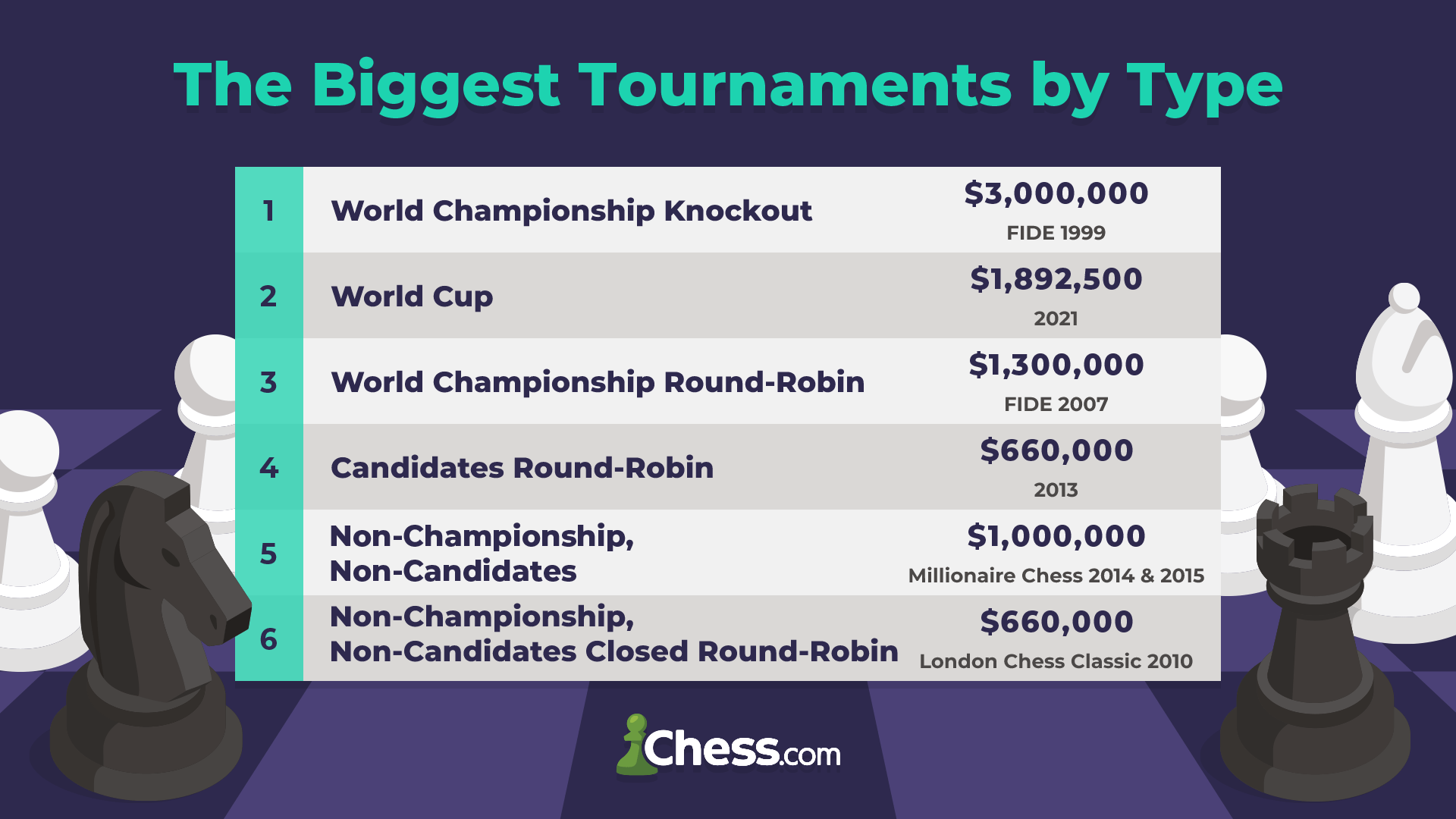
Prize funds seem to have settled around certain benchmarks in the last decade or so: $1-2 million for a world championship, $500,000 for a Candidates, and $300,000 for a major tournament like the Sinquefield Cup or Magnus Tour majors. Then there's the World Cup, the most recent one last year splitting $1.8 million among 206 players.
We'll see how much money next year's world championship can attract without Carlsen's involvement.
Biggest Annual Winners
Becoming a world champion (except between 1948 and 1969) helps your wallet quite a bit during a career, but not always in an individual year. Sometimes when the Candidates and ensuing World Championship occur in the same calendar year, the challenger ends up winning more money in the Candidates and Championship combined than the champion does in the title bout alone. For example, Karpov won more money than Kasparov in 1987 and Caruana won more than Carlsen in 2018.
That said, any guesses on who had the most years as the richest prize-earner in chess?
Unsurprisingly, the top four answers are all kings of longevity. The number one, however, is... Lasker with 13 years, first in 1894 and last in 1924. Karpov was next with 10 years (during 1973-1998), followed by Kasparov (1983-2001) and Carlsen (2009-2021) with nine each.

How Good Is The Money, Really?
Even though prize money has gotten better over the years, chess is still not a huge money sport. As one example, the winningest chess player has earned less than the highest-paid baseball player every single year for which there is data on both going back to the 19th century. The year 1972 was the closest, when Fischer won $156,250 while the best-paid baseball player, outfielder Carl Yastrzemski, earned $167,000. The combined lifetime prize earnings of Anand, Carlsen, Kasparov, Karpov, Kramnik, and Fischer—about $40.6 million—are less than how much pitcher Max Scherzer is making in 2022 alone ($43.3 million).
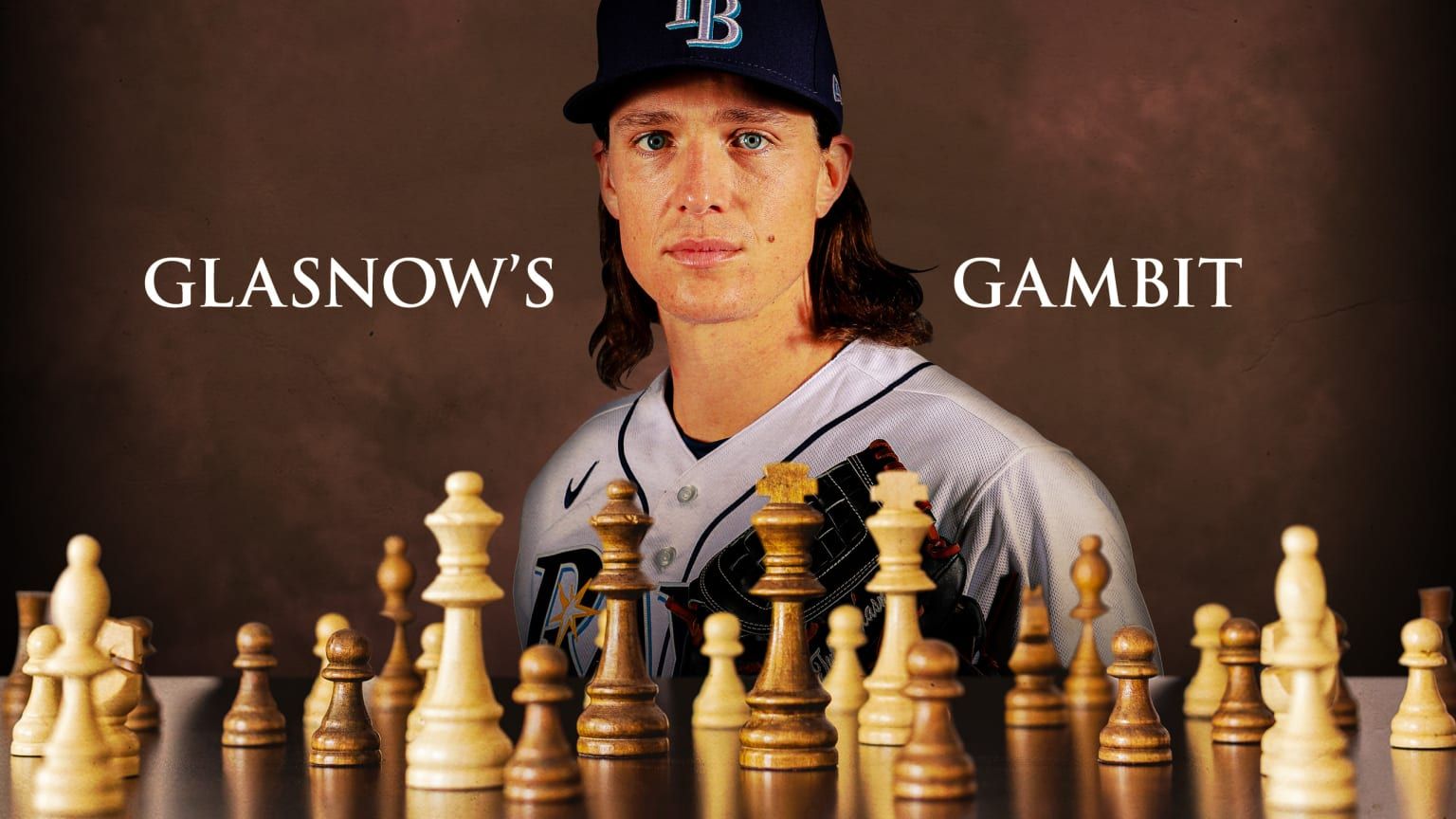
A more interesting comparison might be the World Series of Poker. (Of course, poker is funded in a much different way than chess, as the players raise all the money themselves.) During 1972-2000, the top chess player often made a comparable amount to the World Series Main Event winner and sometimes, like Kasparov in 1990 or Fischer in 1992, held a crushing advantage. The 2003 poker boom left chess in the dust, unfortunately. Carlsen in 2021 is the closest since, and still off by a factor of more than four ($1.8 million vs $8.0 million).
Records For Cheapness
Although a Candidates Tournament usually pays out $500,000 these days, with at least $100,000 to the winner, that was not always the case. The earliest Candidates Tournaments after World War II effectively gave out nothing. In the 1953 Candidates, Smyslov earned $1,147 (about $12,700 today). Even worse was the 1959 Candidates, which Tal won, that awarded for game outcomes but not the tournament. Players earned 60 Swiss francs for a win, 25 for a draw, and 10 for a loss. For Tal, this meant a total of 695 francs, or $161. Yes, 160 bucks, which even today would be worth only about $1,600. You can see why chess players used to struggle to make money!
Conclusion
We've only begun to scratch the surface of possible angles on this subject. Those who want to understand more about how prize money works in chess, how it used to, and the challenges involved in compiling prize money numbers, can read about it in this blog entry.
We hope you enjoyed this article. Did anything in this article surprise you? Let us know in the comments below!







